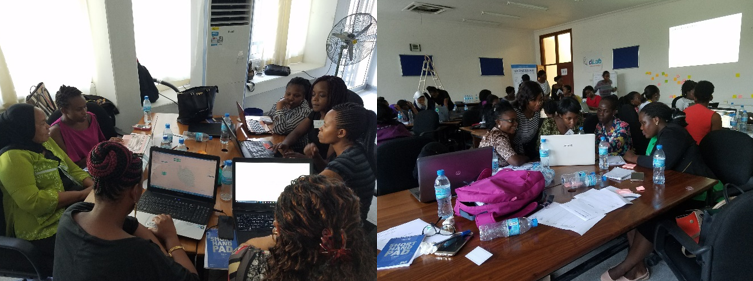PART I IN A SERIES SHOWCASING HOW #DATAMATTERS
The Tanzania Data Lab – or dLab if you’re hip enough - is a data science hub in Dar es Salaam that has come out of a partnership between the Millennium Challenge Corporation (MCC) and the United States President’s Emergency Plan for AIDS Relief (PEPFAR). Working under the umbrella of the Data Collaboratives for Local Impact (DCLI) MCC/PEPFAR partnership, the dLab is at the forefront of building a data-driven ecosystem in Tanzania – at a national level and among individuals - by working concurrently to augment the demand for data, increase the supply of it, and improve local technical capacity.
While the importance of the physical space that the dLab provides – a co-working environment with reliable internet access for innovators and start-ups– should not be underestimated, its heartbeat is the people who comprise the dLab’s Engagement, Training, and Data Science teams. Working in concert, they are nurturing the data ecosystem by recruiting NGOs, government ministries, academic institutions, and community members and securing their buy-in to the principles of data for decision making, providing training in data literacy, analytics, and visualization, hosting an open data portal, and lending out their in-house expertise to tackle complex data problems. With this strategy, the dLab already claims beneficiaries that include both big players - like the National Bureau of Statistics, which has been working with the dLab to implement a tool for managing the data demands associated with tracking the Sustainable Development Goals (SDGs) and Tanzania’s Five-Year Development Plan - and everyday Tanzanians, including students, journalists, and young entrepreneurs, who have come to the dLab for day-long to week-long training programs to build their own data skills.
In three trips to Tanzania over the past six months, I have watched the dLab grow busier and the training sessions grow ever more well-attended. Equally important, the carefully cultivated message of the benefits of open data and data transparency is beginning to bear fruit: Several organizations with on-going relationships with the dLab - including Save the Children Tanzania, IntraHealth International, and C-Sema (a national child welfare advocacy group) - have recently expressed interest in adding their data to the dLab’s Open Data Portal or have sought out help from the data science team for a more customized approach to solving their data needs. As the dLab’s reputation grows, the prospect for community engagement - and demand for data-driven decision-making – will undoubtedly grow with it.
The highlight of my most recent trip was the opportunity to participate in the dLab’s Women in Data Workshop, a three-day training session for women in celebration of International Women’s Day. The workshop was launched with a keynote by Edda Sanga, the executive director of the Tanzanian Women in Media Association who has been at the forefront of women’s rights in Tanzania for decades. In a Data in Storytelling seminar that I then led, more than fifty university students, journalists, researchers, M&E officers, and others – all women – in attendance learned about the process required to take a question and, using data to uncover the answer, turn it into a story. After a brief example, the participants spent the remainder of the day working in groups to formulate their own data stories. With help from my colleague and fellow AAAS fellow Elizabeth Zeitler, the groups tracked down data related to their own interests – ranging from traffic fatality reporting to the efficacy of HIV prevention investments from international aid organizations – and began the process of unearthing the story buried in the data. The day concluded with each group sharing their successes and their challenges, many of which were centered around the difficulty in obtaining the data that they needed.
When I joined the DCLI team, I held an assumption: low demand for data from decision-makers resulted in low data capacity, a feedback loop that would limit future growth in demand; but this was a simplistic – and largely unsubstantiated - view of a complex ecosystem. The popularity of this kind of program – one which more participants attended than had registered – speaks for itself. The people demanding data (and the capacity to use that data) are not just decision-makers, they’re also students and journalists and activists and NGOs: they are people who want to make a case to the decision makers higher up in their organizations; they are the grassroots component of the data revolution. And dLab is there to serve their needs.

#DataMatters is a series highlighting the positive effects of innovations, data, and technology on peoples' lives and livelihoods. If you would like to contribute a #DataMatters post, please contact [email protected]
